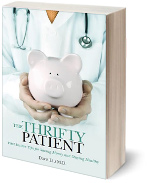Rock Health, Enterpreneurs, Doctors and Witchcraft?
I recently viewed health care through the lenses of a technology entrepreneur by attending the Health Innovation Summit hosted by Rock Health in San Francisco. As a practicing primary care doctor, I was inspired to hear from Andy Grove, former CEO of Intel, listen to Thomas Goetz, executive editor of Wired magazine, and Dr. Tom Lee, founder of One Medical Group as well as ePocrates.
Not surprising, the most fascinating person, was the keynote speaker, Vinod Khosla, co-founder of Sun Microsystems as well as a partner in a couple venture capital firms. 
“Health care is like witchcraft and just based on tradition.”
Entrepreneurs need to develop technology that would stop doctors from practicing like “voodoo doctors” and be more like scientists.
Health care must be more data driven and about wellness, not sick care.
Eighty percent of doctors could be replaced by machines.
Khosla assured the audience that being part of the health care system was a burden and disadvantage. To disrupt health care, entrepreneurs do not need to be part of the system or status quo. He cited the example of CEO Jack Dorsey of Square (a wireless payment system allowing anyone to accept credit cards rather than setup a more costly corporate account with Visa / MasterCard) who reflected in a Wired magazine article that the ability to disrupt the electronic payment system which had stymied others for years was because of the 250 employees at Square, only 5 ever worked in that industry.
Khosla believed that patients would be better off getting diagnosed by a machine than by doctors. Creating such a system was a simple problem to solve. Google’s development of a driverless smart car was “two orders of magnitude more complex” than providing the right diagnosis. A good machine learning system not only would be cheaper, more accurate and objective, but also effectively replace 80 percent of doctors simply by being better than the average doctor. To do so, the level of machine expertise would need to be in the 80th percentile of doctors’ expertise.
Is it possible technology entrepreneurs can disrupt health care? He challenged any doctor in the room to counter his points.
Silence.
Was it because everyone agreed? Were the doctors in the room simply stunned? Was there a doctor in the house? And where did he get that 80 percent statistic?
Was Kholsa serious that technology could make health care better by utilizing large data sets and computational power to clinch better and more precise diagnoses? Was he simply being provocative to hear other points of view to learn even more? Like many others in the conference, he believes that giving consumers more opportunities, access, and choice to information about themselves and their bodies would empower them to do the right thing. He held up an EKG attachment to the iPhone which was just one of many consumer directed products in the pipeline his company has invested in.
Kholsa is a very smart and successful entrepreneur. Does innovation mean the two guys in a garage who come up with a radical idea or is it possible that innovation is having people with different experiences and point of view looking at the same problem as best selling author Malcolm Gladwell noted in his New Yorker piece Creation Myth – Xerox PARC, Apple, and the Truth About Innovation? Surely to make health care better, technology entrepreneurs must engage with doctors. All the speakers before and after Kholsa spoke about the incredible value and insight different stakeholders to bring to the table. The most vocal? The doctor entrepreneurs and those who worked with doctors to bring their ideas to market.
Kholsa’s criticism of the health care system is completely valid.
Can we do better in being more reliable, consistent, and creating a system process and design that is comparable to highly reliable organizations and industries? Of course. Can we be more systematic and doing the right things every patient every time on areas where the science is known to level of the molecule? Yes. Care must be incredibly simple to access, extremely convenient and intensely personal.
It isn’t that we don’t have smart people. Compared to a century ago more illness are understood, specific medications and treatment protocols can be designed. But we haven’t solved it all. When we thought we knew it all, we were shown how little we truly knew. Thirty years ago, doctors predicted the demise of infectious diseases as a specialty, another footnote in medical texts as more powerful antibiotics and vaccines were available. Enter AIDS, the swine flu, and many super-bugs which have humbled our profession. Ask accomplished physician and writer Dr. Abraham Verghese about his experiences. Dr. Verghese is rightly worried, as many others are, that even doctors are being too focused on the iPatient and not on the real patient as he writes in his New York Times op-ed Treat the Patient, Not the CT Scan. Is this what we want our health care system to look like?
Health and medical care is an incredible intersection of technology, science, emotions, and human imperfections in both providing care and comfort.
As conference speaker Dr. Aenor Sawyer, an orthopedic surgeon from UCSF noted, we need to figure out how to have our different cultures of doctors, gamers, designers, and technologists interact. Fixing health care is more than simply “we know the problem and we know the solution”. She reflected that the level of dedication, perseverance, and a willingness to make impact among the different groups demonstrates more similarities than differences.
I know health care can’t simply be solved by smart people in Silicon Valley alone. To solve health care we need everyone to collaborate. As Harvard Business School professor Amy Edmondson noted in her book Teaming –
“For over a century, we’ve focused too much on relentless execution and depended too much on fear to get things done. That era is over…human and organizational obstacles to teaming and learning can be overcome…Few of today’s most pressing social problems can be solved within the four walls of any organization, no matter how enlightened or extraordinary… Generating ideas to solve problems is the currency of the future; teaming is the way to develop, implement, and improve those ideas.”
Perhaps Kholsa’s call to action was simply an entrepreneurial mindset, but simply ignoring those who have chosen a field to improve and safe lives and who meet humanity everyday on the front-lines is problematic and dangerous. There are some things that may never be codified or driven into algorthims. Call it a doctor’s experience, intuition, and therapeutic touch and listening. If start-ups can clear the obstacles and restore the timeless doctor-patient relationship and human connection, then perhaps the future of health care is bright after all.
 Get important exclusive advice and tips on how to save money while staying healthy.
Get important exclusive advice and tips on how to save money while staying healthy. Learn how to make intelligent choices in America's Healthcare System.
Learn how to make intelligent choices in America's Healthcare System.
Pingback: What Doctors should Know when Joining a Startup – Five Key Books | Srraa!